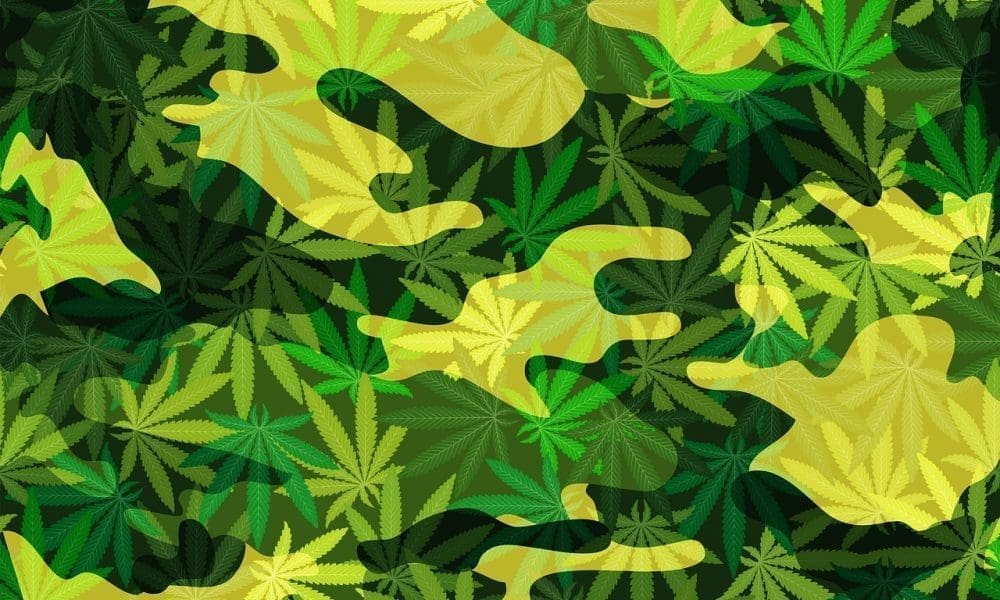A new survey of veterans and their families finds that a majority—57 percent—feels the U.S. Department of Veterans Affairs (VA) should provide medical marijuana to eligible patients.
The respondents were less likely to support VA providing psychedelic drugs, like MDMA and psilocybin, while they supported VA providing ketamine, as well as esketamine, which is a drug similar.
Mission Roll Call is a non-profit that represents veterans. Nearly 2,000 respondents from 50 states provided the results. 95% are veterans themselves or their family members.
Questions about VA substances, such as medical cannabis and psychedelics, were asked in relation to “novel therapies.” Other treatments included abortion, hyperbaric oxygen treatment and obesity treatment.
Mission Roll-Call
Mission Roll Call reported in its survey report that, “in general,” respondents supported the addition of new treatments for illnesses. It added that they are “working closely with several partners” to develop initiatives designed to assist veterans, pointing out hyperbaric oxygen treatment as an example.
Early last year, a separate Ohio State University (OSU) survey found that six in 10 active duty military service members and veterans—as well as 85 percent of military family members—supported legalizing marijuana.
Along the lines of the new poll, that survey found that fewer veterans—four in 10—favored legalizing psychedelics, at least for recreational use. According to the survey, family members, as well as non-military responders, voted in favor of this change.
Support among veterans was markedly higher when it came to doctor-recommended use of marijuana and psychedelics, which an earlier OSU study discussed.
The paper showed that 72 percent of veterans supported the legalization of marijuana by Department of Veterans Affairs doctors and 64 percent of them agreed with psychedelics.
VA officials announced recently that as part of ongoing projects, they were looking for contractors with the expertise to explain and analyze scientific evidence regarding medical marijuana. This will be done to both clinicians and general public.
This work aims at evaluating and communicating cannabis’s possible benefits to conditions such as PTSD, as well as its potential risks to pregnant women and cannabis consumption.
VA reported in a recent filing that about 9 percent (9%) of military veterans have used cannabis for medical purposes in the past 12 months. Veterans have a difficult time talking to VA doctors when they use marijuana.
VA explained that “clinicians will meet patients who use cannabis or have questions regarding its use.” The VA said that discussions about cannabis were difficult in part due to the fact that evidence on the positives and negatives of marijuana is changing and growing rapidly.
In the meantime, earlier this month, VA staff as well as the Secretary met with a veteran advocate who is now advocating for access to psilocybin. They discussed the therapeutic potential that psychedelics have for veterans.
Visit came at a time when VA Secretary Doug Collins is continuing to promote psychedelics for serious mental conditions like post-traumatic disorder (PTSD).
Collins revealed last month, for example that he and Robert F. Kennedy Jr. of HHS Department of Health and Human Services had an “eyeopening” conversation about the potential therapeutic benefits of psychedelic medication. Collins has said he would be open to the notion of the government providing vouchers for the cost of psychedelic treatment for veterans that receive VA services.
During a Senate committee hearing this month, he separately reiterated his commitment to exploring the efficacy of psychedelic therapy to address serious mental health conditions that commonly afflict military veterans.
Recently, bipartisan members of Congress also asked that the VA chief meet them in order to discuss how to give veterans access to psychedelic medicines.
In a letter sent to Collins, Reps. Lou Correa (D-CA) and Jack Bergman (R-MI)—co-chairs of the Congressional Psychedelic Advancing Therapies (PATH) Caucus—said they were “encouraged by your recent remarks about the importance of pursuing research into psychedelic treatments and other alternative treatments to improve Veterans’ care.”
Correa and Bergman separately introduced a bill last month to provide $30 million in funding annually to establish psychedelics-focused “centers for excellence” at VA facilities, where veterans could receive novel treatment involving substances like psilocybin, MDMA and ibogaine.
Bergman has also expressed optimism about the prospects of advancing psychedelics reform under Trump, arguing that the administration’s efforts to cut spending and the federal workforce will give agencies “spines” to tackle such complex issues.
In December, VA separately announced that it’s providing $1.5 million in funding to study the efficacy of MDMA-assisted therapy for veterans with PTSD and alcohol use disorder (AUD).
Last year, Rachel Yehuda, who has overseen some psychedelic research as director of mental health at VA’s James J. Peters Veterans Affairs Medical Center, also touted an initial study the agency funded that produced “stunning and robust results” from its first-ever clinical trial into MDMA therapy.
Shereef Enahal, the ex-VA Under Secretary of Health who served under Shereef in VA from 1996 to 1999 said “it was very encouraging” when Trump chose Kennedy to head HHS and he had supported psychedelics. And he hoped to work with him on the issue if he stayed on for the next administration, but that didn’t pan out.
According to a study, legalizing cannabis reduces workers compensation costs and decreases drug prescriptions by patients.





